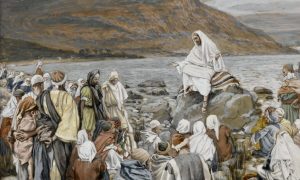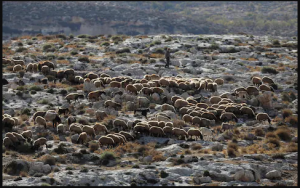Nerys asks: I wonder when you last ran and why you did it?
In the first century, a middle Eastern man never ran. If he were to do so, he would have to hitch up his tunic and show his bare legs which was a humiliating and shameful thing to do. A man of standing would only run if his life or the life of others depended on it. You’ll remember the loving father in the parable of the Prodigal Son, running to save his son from the violent rejection of his community, taking upon himself the shame his son deserved. In both of today’s short Gospel passages, Mark 6.30-34 and 53-56, we hear of men running, although the Greek verb is not always translated as such in our English Bibles. These are connecting passages, part of the framework of one of the multi-layered sandwiches which Mark is famous for. Between them are the accounts of the feeding of the five thousand and of Jesus walking on the water. Before them is the sending out of the disciples and the story of the death of John the Baptist we heard last week
Jesus’ fame is spreading. He is being recognised and followed by crowds wherever he goes, with little time to rest or even to eat on occasions. People are responding to the message but not always in the way Jesus would wish …

(James Tissot)
Have you ever thought what motivated such a large group of men (the word is specifically masculine in Mark) to run around the lake to meet Jesus in such a remote spot? After all, they and their families could have heard him preaching in Capernaum any time. John tells us that after being miraculously fed by Jesus, this same crowd tried to take him by force to make him king. Mark is not so explicit, but there are a few hints to suggest that these men might have seen him as the charismatic figure they needed to rise up against Roman occupation, The wilderness was the traditional place to prepare for an uprising. Were they desperately running in the hope that Jesus would lead them in an armed rebellion?
As Jesus and the disciples seek another deserted place in order to rest, they meet with another crowd, even larger in number and needs than the one they left behind. The town of Gennesaret with its numerous hot mineral springs had attracted the sick and the injured for centuries. Recognising Jesus, people ran to fetch those who couldn’t walk, believing that touching a tassel on Jesus cloak would be enough to heal them. Could it be that the news of how the woman with the haemorrhage was healed had got around. What is certain is that there was a large element of superstition mixed in with their faith. They had no idea who Jesus really was and no interest in getting to know him further. All they wanted was for him to satisfy their need for physical healing.
And yet, Jesus responds to them all with compassion, despite his tiredness and grief, and his need to be alone with his disciples. As he sees the eagerness of these people who are ready to throw away public decorum in order to get to him, his heart is moved. These are people desperate for leadership and desperate for healing. He describes them as sheep without a shepherd, drawing on the rich Jewish imagery familiar to him since childhood, and he responds as the shepherd-king of Jeremiah 23.1-6, our Old Testament reading for today.

In these short passages Jesus through his actions shows himself to be the one who has real concern for God’s scattered, confused and undisciplined sheep. He gives the people what they need, right teaching, feeding and healing.
Here are some questions to ponder and to take to God in prayer:
• Are there times when we run on ahead of Christ instead of following him?
• Are there times when we demand of God physical healing for ourselves or others?
• How does our compassion for all God’s sheep measure up to that of Jesus?
• How can we obtain a greater trust and understanding of God?
From stories like this of Jesus’ ministry we know with certainty that God never ever turns any of us away. None of our needs or wounds or sorrows are hidden from him. Whenever we run ahead of him, whenever we demand healing, he will minister to us, because he loves us. What about finishing your time of worship by reading slowly or singing the well-known paraphrase of Psalm 23, giving God thanks and praise.
The Lord’s my shepherd, I’ll not want;
He makes me down to lie
In pastures green; he leadeth me
The quiet waters by.
My soul he doth restore again,
And me to walk doth make
Within the paths of righteousness,
E’en for his own name’s sake.
Yea, though I walk through death’s dark vale,
Yet will I fear no ill;
For thou art with me; and thy rod
And staff me comfort still.
My table thou hast furnished
In presence of my foes;
My head thou dost with oil anoint,
And my cup overflows.
Goodness and mercy all my life
Shall surely follow me;
And in God’s house forever more
My dwelling place shall be.






